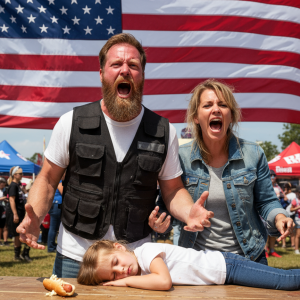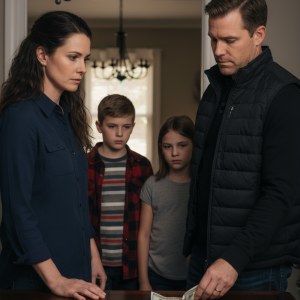The hospital waiting room buzzed with the usual distractions—low murmurs, coughing fits, the hiss of the vending machine, and the sterile flicker of overhead fluorescent lights. Families paced, clutched each other, stared down at their phones, or gazed into space, lost in the uneasy limbo between hope and bad news.
In a worn-down chair at the far end of the room sat an elderly woman, small and still, like a photograph from another time. Her coat was thin, the cuffs fraying, and the color long faded. On her feet were two mismatched shoes—one black, one brown. Resting on her lap was a battered leather handbag, her hands wrapped tightly around it as though it carried something priceless.
No one sat near her.
Some stole awkward glances and looked away. Others avoided her entirely, assuming she was lost, confused, or perhaps homeless. She didn’t fidget. She didn’t make a scene. She simply waited.
A woman nearby leaned toward her husband, her voice just above a whisper. “She probably wandered in off the street. Poor thing.”
Her husband grinned. “Or came for the free coffee.”
Across the room, two teenage girls giggled, imitating the old woman’s slow gestures whenever she shifted in her seat. They nudged each other and stifled their laughter like it was a joke only they understood.
Even the hospital staff weren’t quite sure what to make of her. A young nurse approached with cautious kindness.
“Ma’am,” she said softly, crouching beside her, “do you need help finding someone?”
The old woman lifted her gaze—calm, pale blue eyes that shimmered with age and wisdom—and smiled.
“No, sweetheart,” she said gently, patting the nurse’s hand. “I’m exactly where I need to be.”
Two hours slipped by.
People came and went. Some were called back to surgery updates, others left in tears or joy. But the woman didn’t move. Every so often, she glanced at the swinging doors to the operating wing, her expression serene, almost… expectant.
At precisely 3:12 p.m., the double doors burst open.
A man in green scrubs walked out, mask dangling from one ear, hair damp with sweat, eyes focused despite the fatigue etched in every line of his face. He passed the families gathered along the walls—past the pacing father, past the sobbing daughter—and made a beeline for the quiet woman in the corner.
He stopped in front of her, bent slightly, and laid a gloved hand on her shoulder.
“Are you ready to tell them who you are now?” he asked, his voice loud enough for all to hear.
The room fell into a hush.
She stood slowly, her body trembling just slightly. The surgeon offered his arm, which she accepted with grace.
Turning toward the crowd, she cleared her throat.
“My name is Margaret Greene,” she began, voice soft but steady. “You likely don’t recognize it. Most people don’t. But I once ran the bakery just two blocks from here.”
Some older visitors nodded slowly—faint flickers of recognition.
“I never had children of my own,” she said. “But I took in a little boy who lived in the apartment above the bakery. His mother worked two jobs. His father wasn’t around. He was always hungry, so I fed him. Gave him small chores to earn some money. Helped him read when school became too hard. And when his mother got sick… I was there.”
Her eyes turned to the man beside her, her voice cracking just slightly. “I never stopped being there.”
The surgeon took her hand.
“I was that boy,” he said, the words weighted with emotion. “I’m Dr. Nathaniel Lewis. Chief of Cardiothoracic Surgery. And I wouldn’t be here—none of this would exist—if it weren’t for her.”
He gestured around the room—the people, the hospital, the very walls themselves.
“Today I completed my 1000th heart surgery. And I told my team, there’s only one person I want to share this milestone with. The woman who saved my life long before I ever stepped into an operating room.”
You could hear a pin drop.
The judgment, the whispers, the cruel chuckles—all of it collapsed beneath the weight of truth.
Margaret smiled faintly. “I didn’t come for coffee,” she said. “I came for my boy.”
The silence broke when a single nurse began clapping—hesitant at first. Then another. And another. Until the room swelled with the sound of genuine, heartfelt applause.
The woman who had scoffed at her now sat red-faced, eyes brimming. The teenagers who mocked her looked down at their phones, ashamed. Even the young nurse who had questioned her now stood weeping quietly, hand over her heart.
Dr. Lewis leaned in. “I reserved a table at the café downstairs. For cake. Will you join me, Miss Margaret?”
She laughed, a laugh that sounded like a warm oven on a cold morning. “Only if it’s chocolate.”
They walked out together, arm in arm, as the entire waiting room stood—not out of politeness, but in awe.
Later that day, the hospital posted a photo on their official page. Dr. Lewis and Margaret sat at a small café table, a chocolate cake between them. Her smile wide. His eyes tender.
The caption read:
“Behind every great doctor is someone who believed in them first. Today, we honor Miss Margaret Greene—mentor, caregiver, and the heart behind a thousand healed hearts.”
The post went viral.
People everywhere shared stories of their own unsung heroes—the teachers, the neighbors, the strangers who once showed kindness without expecting anything in return. For a moment, people looked differently at the quiet ones in the corners, the ones often overlooked.
And in a follow-up interview, Dr. Lewis said something that stuck with everyone:
“We all have someone who carried us when we couldn’t walk. Mine just happened to make the best blueberry scones in town.”





